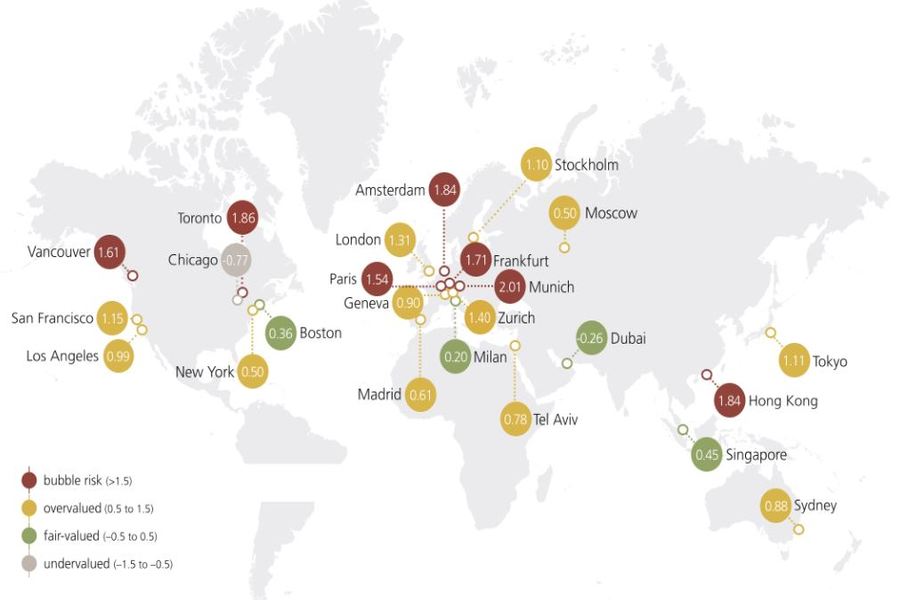
Investing in property is an extremely smart way of using your money, but it is not without its risks. With numerous cities enjoying rapid grown and development, choosing the right location to invest in real estate could prove highly beneficial. The key is to avoid real estate bubbles and to spot trends. The UBS Bubble Index proves highly effective for putting the global house market into perspective. Below we’ll be taking a look at bubble risks and will be providing you with the facts.
Identifying a bubble risk
In property markets, you’ll find that ‘price bubbles’ occur relatively commonly. Whilst they can’t always be forecasted in advance, it certainly pays to know what they are. The term ‘bubble’ originates from the fact that it refers to sustained and substantial mispricing of a specific asset – in this case, a property, that can only be revealed and proven when it ‘bursts’. We are, of course, talking metaphorically as opposed to physically. That’s where the UBS Global Real Estate Bubble Index comes into play, as it is designed to look for trends and patterns in the property market, that might indicate that we are indeed heading for a real estate bubble.
Largest bubble risk cities for 2019
We may be well into the year already, but that doesn’t mean that we’re safe just yet. The threat of a real estate bubble always looms ominously. The cities most at risk of a real estate bubble are:
- Munich
- Toronto
- Hong Kong
- Amsterdam
- Frankfurt
- Vancouver
- Paris
Munich – Munich is at the top of the list this year. Because of the diverse and strong economy, housing prices have soared. Prices have doubled over the last decade and rents have increased by 40%.
Toronto – Between 2000 and 2017, house prices tripled.
Hong Kong – Between 2008 and 2018, real estate prices in Hong Kong increased by more than 50%.
Amsterdam – Over the last 4 years, real estate prices here have increased by more than 10% each year. This has outpaced income growth massively.
Frankfurt – Frankfurt has seen accelerated price growth that has outpaced the country average each year. Prices increased by more than 11% last year alone.
Vancouver – Because of overstretched affordability, and overvaluations, price growth rates here have reversed from 10% to -7%.
Paris – In the French capital, house prices have peaked at an all-time high. In the last 4 quarters, it has seen an increase of 5%.
Cities with overvalued properties (moderate/high risk)
If properties are overvalued, the likelihood of a real estate bubble increases. The cities below are not considered to be quite at risk of a real estate bubble than those listed above, but the threat still remains. Cities with the most overvalued properties include:
- Zurich
- London
- San Francisco
- Tokyo
- Stockholm
- Los Angeles
- Geneva
- Sydney
- Tel Aviv
- Madrid
- Moscow
- New York
Cities with fairly-valued properties (low risk)
The cities in which a real estate bubble is unlikely because of fair property valuation, include the following:
- Singapore
- Boston
- Milan
- Dubai
It is also worth noting that Chicago’s properties appear to be undervalued this year.
Things to take away from 2019’s bubble index
The Eurozone is a factor – One thing that experts have noticed is that index scores have increased in every city within the Eurozone, which is largely driven via low rates of interest.
The end of the boom – For the first time since 2012, average price growth rates have come grinding to a halt. Could this be the end of the boom?
Is affordability a risk? – Over the last decade, surveys have found that median price-income ratios have gone up from 5 to 7 cities in our survey. Needless to say, with property prices increasing, and incomes remaining the same, people are struggling to afford properties.
So, why is real estate still a worthy investment?
First off, the property is still arguably the best investment choice one can make right now, even when in the midst of a price bubble. Investors who have invested in residential properties over the last 4 decades have enjoyed prolonged capital gains, long-term, in most centres. But why is this?
- Technology-driven economic booms has resulted in an explosion in residential demand
- Growth within wealthy households has resulted in an increased demand for residential properties in desirable locations
- Real estate interest rates dipped in the mid-90s, as a result of a demand boom failing to trigger a construction and development boom. This was largely due to building restrictions, which meant that ground rents and prices shot up.
Source: ubs.com